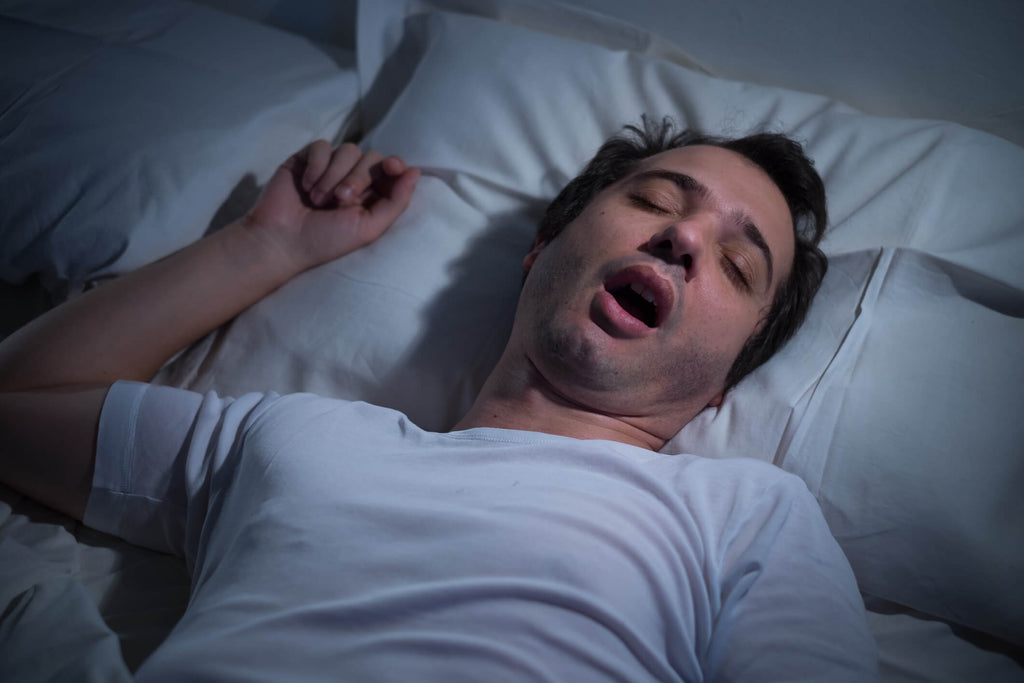How often do you sleep talk? If you don't know, you probably haven't heard of sleep-talking. This strange habit happens when someone talks or mutters words during their sleep.
Sometimes, these utterances are nonsensical; they are coherent and even meaningful.
Sleep talking is a common phenomenon that occurs in both children and adults. The condition usually starts at around age 3 and continues until adulthood.
Some people claim that sleep talking helps them get rid of stress and anxiety. Others say it’s just plain annoying.
Several theories try to explain why people sleep talk. One theory suggests that sleep talking is a way of relieving stress.
Another says that it's a side effect of REM sleep. Still, another claim is that it's caused by REM and non-REM sleep.
What Is Sleep Talk?
Sleep talking is an unusual parasomnia that occurs during REM and Non-REM sleep.
Parasomnias usually happen only during specific parts of the sleep cycle. Sleep talking can occur during either REM or NREM sleep. It's not clear whether this behaviour is linked to dreams or nightmares.
The most obvious sign of sleep talking is loud vocalisations. These sounds can be made while sleeping, and they are usually accompanied by movements such as head banging, arm-waving, and body jerking. There are also instances where sleep talking leads to incoherent speech.
The most common reason for sleep talking is stress. People who have experienced stressful events tend to talk more frequently during sleep. Some studies suggest that sleep talking may be a symptom of depression.
Other theories about why people sleep talk include:
- Stress relief.
- Nightmares.
- Dream recall.
- Brain activity.

How To Know You're Talking In Your Sleep?
While a sleep talker does not know that they talked about something while sleeping, a person sleeping next to the person can help.
You can request your family members to watch you while sleeping to find out if you are talking in your sleep.
Technically, asleep talkers can't know what they talk about as they won't remember it the next day.
As a sleep talker, you may speak a complete sentence, something gibberish, or maybe talk in a different voice or language when you are awake.
However, sleep-talking is harmless if you are not getting violent.
Prevalence Of Sleep Talking
Almost 5% of adults and up to 50% of children sleep talk. Sleep talking is most common when people are worried or tired.
According to the Sleep Foundation, more than 66 percent of individuals have spoken in their sleep at one time.
Sleep talkers speak for less than 30 seconds at a time and do not snore. Some sleep talkers might chat many times throughout the night. Sleep talkers may appear to be conversing with themselves and engage in conversations with others. Sleep talkers may murmur or whisper at various moments; they can also.
Why Do We Sleep Talk?
It's challenging to determine exactly why we sleep. Sleep talking has been linked to anxiety, depression, insomnia, fatigue, alcohol abuse, and other mental health issues.
However, there is no evidence that sleep-talking causes any harm. Some experts believe that sleep talking is simply a natural part of sleep. They say it is similar to yawning, which happens naturally during sleep.
Others think that sleep talking is due to brain activity. This idea states that the brain produces electrical impulses that cause us to talk in our sleep.
Other researchers argue that sleep talking is related to dreaming. The theory suggests that sleep talkers dream while they sleep because they cannot control their thoughts.
Some researchers also linked sleep talking with rapid eye movement (REM) sleep behaviour disorder.
It is also believed that the brain region that stops movements and talking does not function properly, leading to sleep talking.
Some of the listed causes of sleep talking are:
- Stress
- Depression
- Alcohol Abuse
- Insomnia
- Fatigue
- Mental Health Issues
- Sleep Deprivation
- Fever

What Are The Symptoms Of Sleep Talking?
Sleep talking is commonly thought to occur only while a person is asleep. Researchers believe that sleep talking can happen at any of the five stages of sleep.
In stages 1 and 2, asleep talkers usually have an entire discussion without one responding. In stages 3 and 4, sleep talking might sound more like gibberish. When REM sleep occurs, the fifth stage is most associated with dreaming.
Sleep talk can vary in terms of substance and duration. Sleep talking is considered mild when it occurs less than once a week.
Moderate cases may see sleep talking more than once a week, keeping a bedmate awake. Episodes that occur every night can be severe cases.
Sleep talking is not only loud but also disruptive, annoying, and even frightening to bedmates or housemates. It may also be a long-term issue for some individuals that may be addressed by following a healthy lifestyle.
Sleep talking can last anywhere from a week to a year or more in some cases. Sleepwalking, Seizures, night terrors, and confusion are some of the common inclusions of sleep talking.
Severity
- Mild: Less than one episode of sleep talking in a week
- Moderate: Episodes happening more than once a week.
- Severe: Episodes happening several times in a night waking up the bedmate consistently
Duration
- Acute: Episodes of sleep talking for more than a month or so
- Subacute: Sleep-talking episodes for less than a year but more than a month.
- Chronic: Episodes of sleep talking for more than a year.
It is worth noting that sleep talking may or may not relate to a person's life. The symptoms of sleep talking also include:
- One-word response
- Mumbling
- Few distinguishable words
What Are The Causes Of Sleep Talking?
There are many possible reasons why someone would start speaking in their sleep. Some of these reasons include:
Brain Activity
This theory says a connection between the brain and the mouth when we speak.
When the brain sends signals to the mouth, the muscles contract and produce sounds. However, this does not always mean that the person will speak.
Brain Injury
This theory says that if the brain has been injured, the person may begin to speak aloud during sleep.
For example, if you were hit in the head, you may experience memory loss. Therefore, if you sleepwalk after being hit in the head, your body may move around without remembering what happened.
Drugs
If you take alcohol, opioids, and benzodiazepines, they may cause your sleeping patterns to change.
If you are taking medications that affect your sleep, you may wake up and find yourself saying things that you don't remember later.
Disease
If you have a disease such as epilepsy, you may have seizures. These seizures can happen all day or just once at night.
During a seizure, your limbs may twitch uncontrollably. You may also lose consciousness. This condition may lead to sleep talking.
Genetics
Some people are born with a tendency to sleep talk. Other people may develop sleep talking due to a genetic disorder.
Psychological Issues
Psychological issues could include depression, anxiety, stress, or other mental illnesses. People who have psychological disorders tend to speak while asleep.
Stress
People who are often stressed sleep talk because their bodies release chemicals called "stress hormones". These chemicals make it harder for them to fall asleep. They may also feel restless throughout the night.
Depression
People who are often depressed sleep talk because they feel empty inside. Their minds become cloudy, making it hard for them to think clearly. As a result, they may have difficulty falling asleep.
What Are The Risk Factors?
Risk Factors that induce sleep talking are:
1) Age
2) Gender
4) Genetics
5) Family history
6) Medical conditions
7) Personality traits
8) Stressful events
9) Substance use
10) Trauma
11) Sleep apnea
12) Psychiatric illness
13) History of sleepwalking
14) Medications
15) Alcohol consumption
16) Drug
Sleep talking occurs spontaneously and is usually harmless. It may, however, be an indication of a more severe sleep problem or illness in some circumstances.
What Does Your Body Tell You About Sleep Talking?
Your body is trying to tell you something when you sleep talk, but it’s often hard to decipher what that something is.
Sometimes, sleep talking can be a way for your brain to process and release emotions or stressors from the day.
It can also be a symptom of an underlying medical condition, such as sleep apnea or narcolepsy. If you’re concerned about what your body is trying to tell you through sleep talking, talk to a doctor or sleep specialist to get to the bottom of it.
How To Treat Sleep Talking?
There is no one-size-fits-all answer to this question, as the best way to treat sleep talking will vary depending on the individual's underlying cause. However, some general tips on how to treat sleep talking include:
- Identifying and treating any underlying medical conditions that may be causing or contributing to sleep talking.
- Establishing good sleep hygiene habits, such as avoiding caffeine before bed and maintaining a regular sleep schedule.
- Practising relaxation techniques before bedtime.
- Seeking counselling or therapy if sleep talking is causing distress or interfering with daily life.
If you think you may be sleep-talking, speak to your doctor or a sleep specialist to discuss treatment options.
What Do People Usually Talk About In Their Sleep?
Most people don't talk in their sleep. But, sometimes, people talk in their dreams. They tend to say things like "I'm sorry" or "It was my fault." This type of dream-talking isn't unusual.
Dream talking happens during REM (Rapid Eye Movement) sleep. During this stage of sleep, your body is still very active, so your mind has plenty of opportunities to wander.
Scientists estimate that up to 10% of our thoughts occur while sleeping.
Is It Normal To Sleep Talk?
No! There are many different reasons why someone would sleep talk. Some common causes include:
Narcolepsy - When you experience sudden episodes of falling asleep without warning, called cataplexy.
Insomnia - Difficulty sleeping due to anxiety or depression.
Sleep Apnea - Breathing problems that interfere with restful sleep.
Restless Leg Syndrome - Uncomfortable sensations in the legs and arms that keep you awake at night.
Other Medical Conditions
These conditions can affect the central nervous system and lead to sleep talking.
Traumatic Brain Injury - A head injury can make a person more prone to sleep talking.
Medications - Certain medications can also contribute to sleep talking. Talk to your doctor about which ones you take.
Alcohol Use Disorder - Excessive drinking can disrupt sleep patterns, making it difficult to fall asleep and stay asleep.
Anxiety Disorders - People who suffer from anxiety disorders often find themselves unable to relax and drift off into sleep.
Depression - Depressed individuals will often complain of insomnia and other sleep issues.
Stress - Chronic stress can cause insomnia and fatigue, ultimately leading to sleep talking.
Hypothyroidism - Low thyroid function can cause excessive daytime drowsiness and difficulty staying alert at night.
Diabetes - Diabetics frequently report sleep disturbances such as interrupted sleep, waking up too early, and poor-quality sleep.
Migraine Headaches - Painful headaches can prevent you from getting good quality sleep.
Parkinson’s Disease - People with Parkinson’s disease often experience sleep problems, including nighttime awakenings and restlessness.
Epilepsy - Epileptic seizures can be accompanied by sleepwalking and talking.
Alzheimer’s Disease - Patients with Alzheimer’s disease have trouble maintaining concentration and focus, which leads to sleep interruptions.
Autism Spectrum Disorder - Individuals on the autism spectrum often struggle with social interactions, leading to sleep disorders.

FAQs
Now that you know all about sleep talking, let’s take a look at a few frequently asked questions.
When Should You See The Doctor?
Once a week, once a month, or any time you're concerned about your sleep should speak with your doctor. If you have concerns regarding the amount or quality of sleep you get, or if you feel tired and weary even though you believe that you are getting enough sleep, discuss those worries with your doctor.
Why Shouldn't You Wake Up The Sleep Talker?
According to experts, it is generally considered safe for a sleepwalker to wake up. However, attempting to wake up sleepwalking may result in an aggressive response that can harm the person trying to rouse them.
As a result, it's usually best not to disturb the sleepwalker.
Wrap Up!
If you're experiencing sleep talking, there are several possible reasons. It could simply be a harmless side effect of a medical condition.
So, if you think you might be suffering from narcolepsy, contact your doctor immediately. If you believe you are having a stroke, call 911 right away. Moreover, if you suspect you have another medical problem that could be causing sleep talking, consult with your physician.
Furthermore, you may also take steps to improve your sleep. These may include getting a softer and more comfortable mattress and other bedding accessories. What’d be a better place to get your new mattress from other than Crafted Beds? We offer premium quality mattresses made with the most natural materials, that care about your back, your allergies, and above all, your sleep. So go and grab yours right now!
 Buy direct and save 70% + and extra 5% off using code: DIRECT5
Buy direct and save 70% + and extra 5% off using code: DIRECT5







